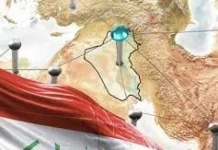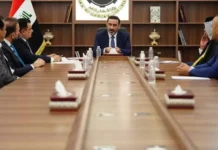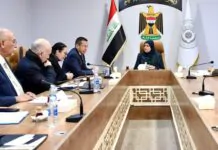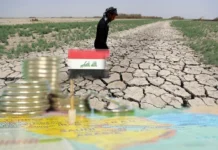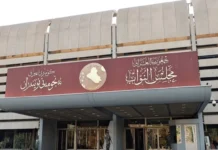Rafidain Bank: There Are No Indications Of Any Liquidity Crisis Or Banking Panic
Banks Economy News – Baghdad Rafidain Bank confirmed on Saturday that its financial position is strong and solid, with a legal reserve of more than 8 trillion dinars deposited with the Central Bank of Iraq. The bank also indicated that there are no indications of any liquidity crisis or banking panic.
In a statement seen by Al-Eqtisad News, the bank said, “Rafidain Bank is not just a bank, but a sovereign pillar of the state’s economy. Since its establishment in 1941, it has remained steadfast in serving citizens and the state, overcoming all economic and political crises without any hesitation in fulfilling its obligations. It is not just a financial institution, but an extension of the state’s identity and a center of trust for more than 12 million citizens.
” The bank stressed that “talk about ‘deposit differences’ is incomplete and misleading,” explaining that “bank deposits are not held as raw cash, but are managed within a precise banking operating system that includes: retail loans, government bonds, small project financing, and liquidity investment according to financial safety standards. Circulating information outside this context confuses public awareness and undermines confidence.”
He added, “There are no indications of any liquidity crisis or banking panic,” stressing that “Rafidain Bank’s financial position is strong and solid, with a legal reserve of more than 8 trillion dinars deposited with the Central Bank of Iraq. Liquidity is available, deposits are secure, and there are no emergency withdrawal requests or operational irregularities.”
He pointed out that “the bank’s reputation is not just a brand name, but a national asset. We realize that banking reputation is not measured solely by assets, but by the depth of the relationship between the bank and its community. Rafidain has maintained its commitment to citizens in the most difficult circumstances, and today it embodies the financial confidence of the Iraqi state.”
He continued, “We do not accept comparisons with banking collapses in other countries,” explaining that “comparisons between Rafidain Bank and banks that have collapsed in other countries lack objectivity. Rafidain is not exposed to foreign markets, does not carry speculative debts, and operates under the direct supervision of the Central Bank of Iraq, with a clean record of obligations.”
The bank warned of “the danger of being dragged into political and media controversy,” stressing that “the banking sector cannot tolerate smear campaigns or fragmented rumors, and ill-considered skepticism may create a disturbance in public confidence, which we warn against and reject.
There is a difference between professional criticism and irresponsible media escalation.”
It continued, “It has undertaken radical and strategic reforms to return to the international arena, including initiating a comprehensive modernization of its systems:
• Contracting with EY and K2 Integrity to develop governance and compliance.
• Adopting the global banking system Oracle Flexcube.
• Operating modern AML and KYC systems.
• Opening international correspondence channels in preparation for a confident return to the global financial system.
” The statement concluded, “We are not asking for special protection, but we ask that the bank be left outside circles of controversy. It is an institution for all Iraqis, and its silence in the face of crises does not indicate its weakness, but rather its maturity and loyalty to the people. Let us preserve what remains of trust in state institutions.” https://economy-news.net/content.php?id=55086
Gold And Dollar Prices Rise In Iraqi Markets
Buratha News Agency1802025-05-03 On Saturday, May 3, 2025, local and global markets witnessed a significant rise in gold and dollar prices, amid ongoing economic fluctuations and internal pressures that impacted trading activity in the Iraqi market. The price of an ounce of gold reached $3,241 globally, which directly impacted gold prices in the Iraqi markets, as the price of one mithqal rose to unprecedented levels, as follows:
24 karat: 770 thousand dinars
22 caliber: 707 thousand dinars
21 karat: 675 thousand dinars
18 karat: 578 thousand dinars
Regarding the dollar exchange rate against the Iraqi dinar, local markets witnessed a relative increase, with Baghdad exchange offices recording: Purchase price: 143,750 dinars per $100 Selling price: 145,750 dinars per $100
The exchange rate on the Baghdad Stock Exchange reached 144,750 dinars per 100 dollars.
https://burathanews.com/arabic/economic/459630
The Dollar Price Stabilized In Local Markets With The Closing Of The Stock Exchange
Saturday, May 3, 2025, Economic Baghdad/ NINA / The dollar prices stabilized in the markets of Baghdad and Erbil on Saturday, with the closing of the stock exchange at the beginning of the week.
The dollar prices recorded stability with the closing of the Al-Kifah and Al-Harithiya stock exchanges, recording 144,750 dinars for $100, the same prices recorded this morning.
The selling prices in exchange shops in the local markets in Baghdad witnessed stability, as the selling price reached 145,500 dinars for $100, while the purchase price reached 143,500 dinars for $100.
In Erbil, the dollar recorded a slight decrease, as the selling price reached 144,700 dinars for every $100, and the purchase price reached 144,550 dinars for $100. /End https://ninanews.com/Website/News/Details?key=1224452
The Iraqi Economy And The Risks Of Limited Diversification
Dr. Haitham Hamid Mutlaq Al-Mansour The Iraqi economy is experiencing a gap between the government’s efforts to promote growth on the one hand, and the structural challenges that hinder growth and stability on the other.
Although Iraq possesses enormous oil wealth, ranking third in the world in oil reserves, its near-total dependence on crude oil exports, which account for more than 90% of general budget revenues, makes it vulnerable to global market fluctuations and hinders the diversification of its production base. This limits its resilience to external shocks and limits the national economy’s response to reform requirements.
Overall activity indicates that the Iraqi economy is witnessing development in oil production infrastructure, such as joint ventures with international companies in the Majnoon and West Qurna fields, for example.
This has led to an increase in total production to approximately 3.5 million barrels per day since the end of 2023, with plans to reach 5 million barrels in the coming years. This is in addition to improved resource management following the approval of the Oil and Gas Law, which has not yet been fully implemented.
Meanwhile, we are witnessing an expansion in investment in reconstruction projects in cities such as Mosul and Basra, supported by foreign investment, particularly from the Gulf, and the development of the Grand Faw Port, a strategic project to stimulate foreign trade.
On the other hand, we see a limited trend toward diversification in a few sectors, limited to limited government plans for developing agriculture and industry, such as supporting local production in the food sector, and the launch of the National Development Strategy 2020-2030, which witnessed weak implementation according to the World Bank’s assessment.
In terms of international economic relations, the use of the Chinese yuan instead of the dollar in oil trade with China is noted, as are agreements with neighboring countries such as Jordan, Egypt, and Saudi Arabia to establish joint industrial zones.
But one of the most prominent challenges facing economic growth and economic reform in general is the scourge of financial and administrative corruption. Iraq ranks low on the Transparency International Index (ranked 154th out of 180).
According to World Bank estimates, 30% of the budget is eroded annually due to corruption.
Meanwhile, the employment index suffers from high levels of unemployment and disguised unemployment. The unemployment rate exceeds 15%, reaching 30% among youth.
This is due to increasing levels of public spending, its high contribution to total employment, and the prevalence of disguised unemployment among more than 4 million employees. Inflation is also expected to rise to approximately 7% by the end of 2024.
After oil prices witnessed a decline due to global demand resulting from the slowdown in Chinese growth and the rise in US interest rates, this affected budget revenues and increased the 2024 budget deficit, which was approved at 198 trillion dinars (about $152 billion), with an expected deficit of 48 trillion dinars (24%), increasing reliance on domestic borrowing.
This brought the domestic public debt to 80 trillion dinars (about $55 billion). Due to the inflation rate, which rose to 7.5% in 2024 compared to 6% in 2023, the value of the dinar decreased against the dollar with the increase in demand for imports due to the lack of flexibility of the local production base.
Therefore, the Central Bank took measures to raise the interest rate to 7.5%, in addition to raising the legal reserve ratio from 15-18% and tightening controls on dollar transfers to combat smuggling and money laundering.
Not long ago, the Central Bank’s foreign reserves were also witnessing a significant decline, according to the bank’s own statistics. The decline reached $7.5 billion as a result of compensatory sterilization measures to mitigate the decline in dollar supply on the parallel market, posing a threat to the government’s long-term inflation shield.
Given the real distortions in the Iraqi economy that affect the structure of aggregate demand, spending, and investment, with serious repercussions for the business sector, and in light of the limited government interventions and the expected continued decline in global oil prices, one of the important steps to ensure the success of the economic reform process is to emphasize the reduction of rentierism through the following:
Develop a foreign investment strategy in specific, productive sectors, with a clear plan, objectives, and tools for investment, implementation, oversight, and anti-corruption, including the oil, petrochemical, extractive, and mining sectors.
Strengthening the investment strategy by issuing a package of laws that attract foreign investment and implementing real reforms to raise the expected level of marginal capital efficiency, which will directly impact the movement and direction of private capital and increase its productivity in the sectors mentioned in the first point.
Directing oil revenue savings to investments in infrastructure, education, health, housing, industry, and agriculture, and expanding the scope of derivative investments.
Rationalizing public spending policy and taking measures to ensure financial control and financial sustainability of the depleting economic resource, and coordinating with monetary policy to reform the banking sector and facilitate investment financing through banks to achieve stability and growth.
These signals are likely to achieve economic reform in the financial and real markets, and subsequently increase economic growth through financial compensation from investment returns, reducing the general budget deficit, and enhancing the government’s ability to expand non-oil GDP and absorb external shocks. This will then increase the sustainability of domestic public debt and achieve low and stable inflation. Otherwise, the Iraqi economy will reach a crossroads: either embark on diversification and stability, or continue its dependence on oil, with the risks of rents and instability.
https://economy-news.net/content.php?id=55062
The Central Bank Of Iraq Reveals The Size Of The Reserves At Rafidain Bank
Banks Economy News – Baghdad The Central Bank of Iraq revealed, on Saturday, the size of the reserves at Rafidain Bank.
According to a Central Bank document, “Rafidain Bank’s unused mandatory reserve balance has reached 4 trillion and 277,083,782,782 dinars, while its used reserve has reached 4 trillion and 263 billion dinars. Thus, Rafidain Bank’s total reserves at the Central Bank exceed 8 trillion and 540 billion dinars.” She added, “It has not been touched in any way, shape or form.”
https://economy-news.net/content.php?id=55057
For current and reliable Iraqi news please visit: https://www.bondladyscorner.com/

